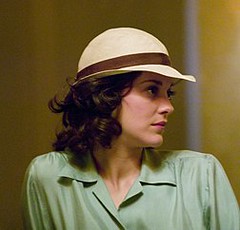The Woman is Red: The Racebending of Billie Frechette
By Gabriel Canada
That is why it was even more disappointing that–though Billie’s romance was central to the plot of this new film and it was closer to the truth in almost every way–”racebending” was still employed, unapologetically. Marion Cotillard still introduces herself as half-Indian in her first scene. She makes it clear that she’s been scorned for it, saying that most guys don’t like that about her. (I am left with the impression that it isn’t “most guys” who wouldn’t like that about Billie, but rather “most guys in Hollywood.”)
Which is baffling. Michael Mann, the director of Public Enemies, was also the director of Last of the Mohicans and Heat. He played a large part in launching the careers of actors of color like Wes Studi and Eric Schweig in the 1990s. Though Mann keeps the context of Billie’s heritage intact in the film, and has a history of working with First Nation actors, we are left with Cotillard–who, like Phillips before her, is far removed from the Wisconsin reservation where Frechette lived most of her life. The only way to let the audience know Cotillard is playing an Indian is for the actors to come straight out and say it, as if denied the use of a buckskin dress, Hollywood simply didn’t know how to introduce an audience to a First Nations woman in a speakeasy.
Billie Frechette is the sole heroine in these Dillinger films, where tough guy gangsters are mowed down in hails of bullets and G-men don’t bother to flash their badges before opening fire. Yet, the first thing the film makers want the audience to know is that she is half Indian. It makes me wonder: If that detail about her is so important, why was this overlooked by the casting directors?
We are meant to feel sympathetic for Billie in Public Enemies and Dillinger. Not much good happens to her. She goes to jail and is tortured by the FBI for little more than falling in love with the wrong guy.
The films take pains to suggest she was with that wrong guy because no one wanted to dance or drink with an Indian. Well, if anyone is responsible for that last plight of Billie onscreen, it is Hollywood itself. Crime may not pay, but Hollywood–for whatever reason–still thinks racebending will.


No comments:
Post a Comment